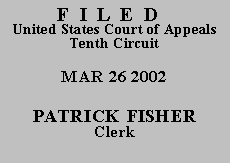

| DARRICK D. REED,
v. T. C. PETERSON, Warden, |
No. 01-6362
(No. 01-CIV-1014-C) |
Reed pled guilty to possession of a firearm by an unlawful user of marijuana in violation of 18 U.S.C. § 922(g)(3) and was sentenced to thirty-seven months imprisonment and three years supervised release. On February 21, 2001, his initial 28 U.S.C. § 2255 motion to vacate, set aside, or correct his sentence was dismissed as time-barred.
Pursuant to the Antiterrorism and Effective Death Penalty Act of 1996, a second or successive § 2255 motion may not proceed unless it is certified by a panel of the appropriate court of appeals to contain
(1) newly discovered evidence that, if proven and viewed in light of the evidence as a whole, would be sufficient to establish by clear and convincing evidence that no reasonable factfinder would have found the movant guilty of the offense; or
(2) a new rule of constitutional law, made retroactive to cases on collateral review by the Supreme Court, that was previously unavailable.
28 U.S.C. § 2255 para. 8. On May 2, 2001, this Court denied Reed leave to file a second or successive § 2255 motion to challenge his sentence under the United States Sentencing Guidelines. Two months later, Reed filed the instant petition for habeas relief, ostensibly under 28 U.S.C. § 2241, alleging that imposition of his sentence involved a misapplication of the same guidelines provision. The district court construed the petition as one that should have been filed under § 2255, and as such, the court held that the petition should be dismissed as an improper second or successive motion to vacate, set aside, or correct his sentence.
We conclude that the court below correctly construed Reed's motion as one filed under 28 U.S.C. § 2255. Although execution of a sentence is subject to challenge via 28 U.S.C. § 2241, the appropriate vehicle for challenging the validity of a sentence is 28 U.S.C. § 2255. See Haugh v. Booker, 210 F.3d 1147, 1149 (10th Cir. 2000). Consequently, we AFFIRM the dismissal of Reed's motion for substantially the same reasons stated below. Reed's application to proceed in forma pauperis is GRANTED.
The mandate shall issue forthwith.
ENTERED FOR THE COURT
Carlos F. Lucero
Circuit Judge
*. The case is unanimously ordered submitted without oral argument pursuant to Fed. R. App. P. 34(a)(2) and 10th Cir. R. 34.1(G). This order and judgment is not binding precedent, except under the doctrines of law of the case, res judicata, and collateral estoppel. The Court generally disfavors the citation of orders and judgments; nevertheless, an order and judgment may be cited under the terms and conditions of 10th Cir. R. 36.3.